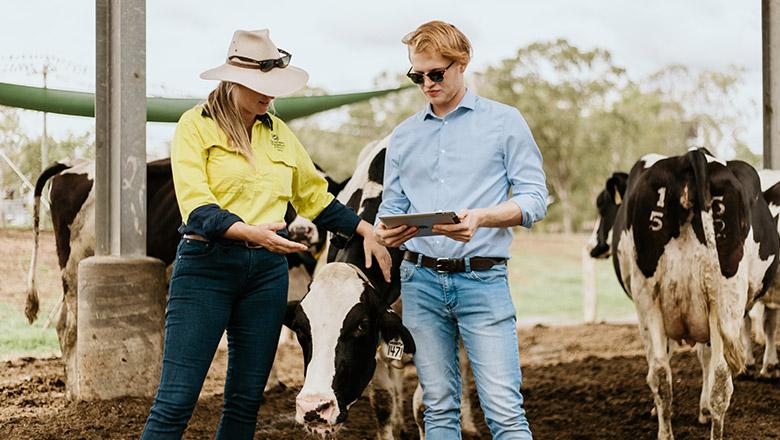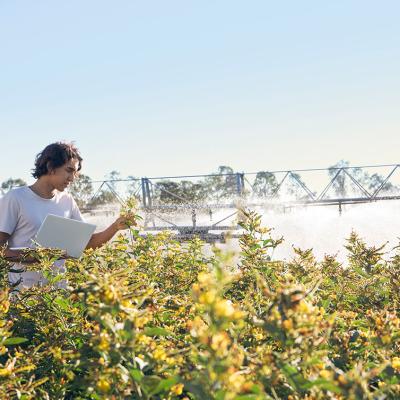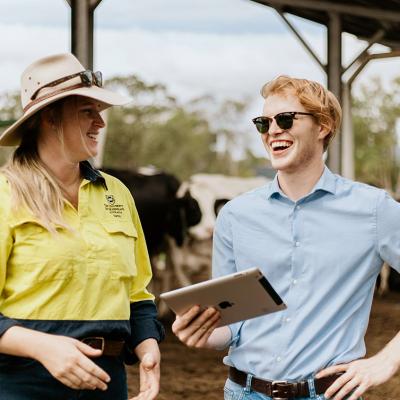With the demand for food, fibre, and sustainable practices increasing, the role of agriculture has never been more vital.
As global challenges like climate change, population growth, and resource scarcity grow, demand for skilled professionals who can innovate and drive change in the agricultural sector is increasing.
The University of Queensland (UQ) offers programs in agricultural science and agribusiness to prepare students for the evolving global agriculture opportunities. Currently, there are an average of 6 jobs for every graduate in this sector, and the market demand is surpassing the current numbers studying agriculture and agribusiness.
But what is the difference between agriculture and agribusiness? Let's discuss the nuances between the two, and explore how you could turn one (or both!) into a rewarding career.
The role of business and science in modern agriculture
Despite sounding similar, there are distinct differences between agricultural science and agribusiness. They offer unique discipline-based skill sets that are complementary and can pave the way for successful careers in modern agriculture.
Agricultural science is the foundation of agricultural advancement. It's about understanding and applying the biological, chemical, and physical aspects of farming. Depending on your major, you'll learn about:
- crop and soil sciences
- animal husbandry
- genetics
- sustainable agriculture practices.
Agricultural science graduates are the innovators and problem-solvers who develop new crop varieties, improve livestock health, and create sustainable farming methods.
While agricultural science focuses on the scientific and technical aspects of farming, agribusiness focuses on the commercial world behind agriculture, its pursuit of sustainability and the value chain that links producers and consumers. It encompasses topics from practical farm management and supply chain logistics to economic market analysis and government policymaking. Agribusiness graduates are the leaders who shape the business strategies that drive the agricultural sector globally.

The intersection of agricultural science and agribusiness
One of the strengths of UQ's programs is that they recognise the interdependent relationship between agricultural science and agribusiness. Many challenges in agriculture require a holistic approach that combines technical knowledge with business expertise. This creates a unique opportunity for students to pursue interdisciplinary careers.
For example, an agricultural scientist works collaboratively with an agribusiness manager to develop a new drought-resistant crop variety to respond to demand from farmers given the increased concerns over drought risks and persistent issues of food insecurity. An agribusiness manager can support this research and development through analysing market demand, creating a business plan, and managing the commercialisation of this innovation, while the scientist focuses on the technical side. This collaboration between the two disciplines is where game-changing advancements occur.
The UQ advantage
UQ stands out as a leader nationally for these disciplines and is currently ranked #1 in Australia for agriculture and forestry.* Here’s why:
- World-class teachers: UQ is home to a faculty of globally respected experts in agricultural science and agribusiness. Your lecturers aren’t just teachers; they're active participants in cutting-edge research and industry collaborations. When you study here, you learn from the best practitioners in the field who bring their latest discoveries into your classes.
- State-of-the-art facilities: UQ provides access to world-class research facilities and farms. Whether you're studying plant genetics in a high-tech lab or gaining hands-on experience in animal husbandry, you'll have access to the latest tools and resources at UQ’s Gatton campus and its surrounding farmlands.
- Industry connections: UQ maintains strong relationships with key producers and industry groups in the agricultural sector, both locally and globally. This means students have opportunities for internships, industry placements, and networking that can jumpstart their careers, such as the Summer Research Program, or the Industry Placement course.
- Practical learning: The agricultural science and agribusiness programs at UQ strongly emphasise practical learning. You won't just be sitting in classrooms; you'll be out in the field, conducting experiments, talking to producers and industry professionals, and solving real-world problems.
*QS World University Rankings 2023

Where could these degrees take you?
The career paths for graduates in agricultural science and agribusiness are diverse and globally focused. Here are just a few of the exciting job opportunities that await our graduates.
Careers for agricultural science graduates
- Agricultural Scientist: Work in research and development roles, conducting experiments to improve crop yields, develop sustainable farming practices, or enhance animal health.
- Crop Consultant: Advise farmers on optimising crop production, managing pests and diseases, and adopting sustainable practices.
- Livestock Manager: If you have a passion for animals, as a livestock manager, you will oversee the health and wellbeing of farm animals and ensure their efficient, ethical, and sustainable production.
- Environmental Consultant: Agricultural scientists also understand how to devise and implement sustainable farming practices and environmental conservation, making them valuable consultants for businesses and government agencies.
- Technology Specialist: Technology is becoming a critical component of modern farming, and there are increasing opportunities to work for companies specialising in activities such as precision agriculture, remote sensing, digital crop and animal monitoring, and virtual fencing.
Explore more careers in agricultural science
Careers for agribusiness graduates
- Agribusiness Manager: These professionals play a managerial role in business planning, analysing global and national market trends, pricing strategies and trade policies, managing human and financial resources, and providing strategic advice to help businesses.
- Farm Manager: Agribusiness graduates manage farms, making strategic decisions on crop and livestock selection, sustainable resource allocation, managing staff, and how to increase profitability.
- Supply Chain Manager: In a globalised economy, managing the flow of agricultural products from farm to market is crucial. Agribusiness graduates are specialists in supply chain and logistics management, recognising the importance of value adding and sustainability.
- Policy Analyst: If you're interested in shaping agricultural policies, you can work for government and intergovernmental agencies or advocacy groups to influence decisions that impact the entire agricultural industry.
- Marketing Manager: Agribusiness graduates are employed in marketing roles, helping agricultural producers and distributors to reach consumers effectively.
Explore more careers in agribusiness
Expand your career options
Why not consider studying a dual degree in Agribusiness and Agricultural Science to broaden your career horizons and gain valuable, complementary skills? You will find employment with producers, distributors and organisations globally who will value your unique perspective that combines business and science in an agricultural context.

Nourishing the future
In response to climate change, the world's agricultural landscape is evolving rapidly. The need for sustainable practices, innovative technologies, and skilled professionals who can apply specialised knowledge has never been greater. UQ's agricultural science and agribusiness programs will provide you with the level of knowledge, skills, and experience needed to thrive in this dynamic industry.
Whether you're passionate about improving crop yields, ensuring food security, or shaping the business strategies that drive agriculture forward, UQ can help you achieve your career goals. Join us to gain the skills to deliver these solutions and ensure the future of sustainable agriculture for generations to come.





